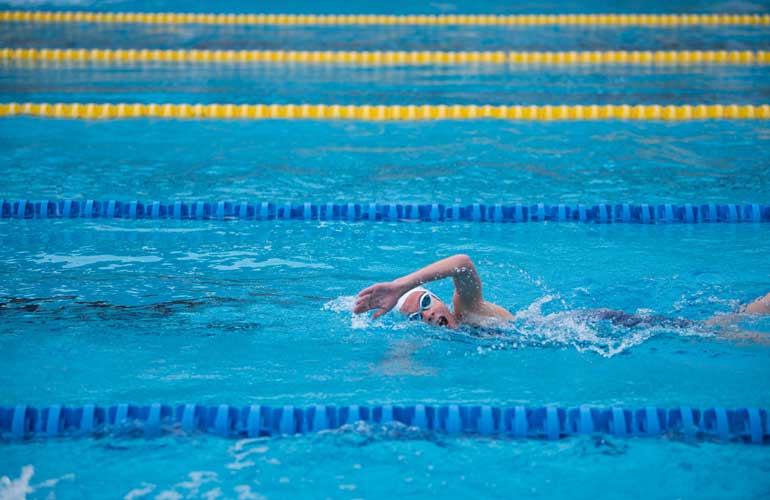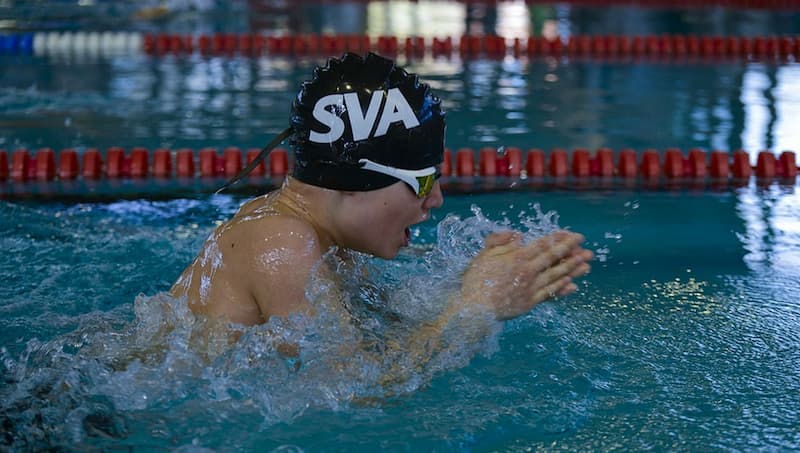Do You Sweat When You Swim?
During high-intensity exercise, the body sweats to cool down, even in water. Swimmers are unlikely to notice the sweat, however, as the water immediately washes it away. So, do you really sweat when you swim? I’ll talk about swimming and sweating from an empirical and scientific perspective.
Do Swimmers Sweat?
Swimmers sweat when they swim. If your body temperature rises during vigorous swimming, your body will sweat to cool it down, even in the water. Most of the time, swimmers don’t notice that they are sweating because water washes it away. Symptoms of sweating while swimming include: heavy breathing, thirst, and warmth.
It’s important to note that sweating can impair your swimming performance if you don’t manage it well. We’ll discuss this later in the article – for now, let’s start by discussing why you’re sweating because it’s important to understand.
Why Do Swimmers Sweat?
In biology, there is a term called homeostasis. This means that your body maintains a constant internal environment, regardless of internal and external changes.
Your core body temperature is part of this internal environment. Our bodies are designed to maintain a core body temperature of ±37°C/98.6°F. This is achieved through thermoregulation.
This means that if your body temperature drops, your body will try to heat itself up through shivering, vasoconstriction, and hormonal changes. If you’ve ever swum in a frozen pool, you’ve probably experienced this.
A similar thing happens when body temperature rises, but this time your body cools down through sweating, dilation of blood vessels, and other mechanisms.
Your body has to cool itself because of the increased number of sweat glands, and there are millions of them, so sweating is the main way your body does this.
When overheating occurs, the hypothalamus in the brain stimulates these sweat glands to release fluid.
When sweat evaporates (or is washed away), heat is expelled and your body cools down.
How Much Do You Sweat When You Swim?
This is an important question to ask because you need to make sure you’re hydrating enough during your workout to replace the water you lose through sweating while swimming, but more on that later.
The first study, published in the Journal of Exercise Science and Medicine, found that male swimmers sweated an average of 138 milliliters per kilometer and female swimmers 107 milliliters per kilometer.
How Can I Tell If I Am Sweating In Water?
Obviously, when you swim you never see the sweat and never really feel hot, but all you can feel is being out of breath. If you’re having trouble breathing during some part of your swimming workout, you’re likely to be sweating. Since there are no natural indicators, it can be difficult to tell when dehydration begins, so it’s important to maintain plenty of fluid intakes.
If you’re wearing a cap, this can cause more sweat to stay under the cap, causing you to lose more electrolytes. Replacing them with water or natural energy drinks will not only keep you healthy but also improve your performance.
The Dangers of Dehydration In Water

Dehydration is hard to notice when in water. However, just because you didn’t notice, doesn’t mean it didn’t happen! Dehydration is dangerous and can have harmful effects on the body.
Dehydration occurs when your body consumes more water than it takes in. This can negatively affect your body because it prevents the body from performing its normal functions. Symptoms of dehydration include thirst, irritability, headache, weakness, dizziness, cramps, and heartburn. Extreme dehydration can cause vomiting, nausea, fainting, and eventually heat stroke.
Dehydration, which only accounts for 1-2% of total body weight, begins to affect its ability to perform. When your body isn’t getting enough water, it can cause your heart rate to spike, making your workouts feel extra challenging. Dehydration is also common in hot, humid environments, which is why it’s especially important to stay hydrated while swimming.
What exactly do we lose when we sweat? Sweat is pretty much just water with small amounts of ammonia, salt, and sugar. When you sweat, you also lose electrolytes. Electrolytes help our bodies function properly by keeping the Ph level balanced and regulated. They help build new tissue, help blood clot, control muscle contractions, and regulate fluid levels. Hydration is especially important for maintaining our electrolyte levels.
To avoid dehydration, carry a water bottle with you before, during, and after your workout. The best athletes know they need to take regular sips of water throughout their workouts. Research shows that you should drink at least half a liter of water during a swimming workout to avoid dehydration.
When exercising, hydration is your best friend. Water regulates body temperature and lubricates joints, allowing the body to perform at its peak. It also improves muscle function and circulation while regulating blood pressure. Hydration is critical for Olympians, recreational swimmers, and everyone in between.
As weird as this may sound, the best way to check if you’re hydrated is to look at the color of your urine. The lighter the color, the more hydrated you are. So, next time you go to the bathroom, see if you’re drinking enough water. We promise not to judge.
Is It Okay to Swim After Sweating?
Swimming after a sweat is a great way to cool off, especially after a challenging dry-land workout or weight training. That said, for many competitive swimmers, it’s only temporary relief. When the main training session begins, your body temperature will rise again as the training intensity increases.
Final Words
Do You Sweat When You Swim? In short, the answer is yes. The longer answer is that it doesn’t sweat as we know it. You see, swimming pools are usually much cooler than our core body temperature. This means they will keep us cooler than in a warm gym.
